Best CPUs For AMD RX 7700 XT
Introduction
Why the Right CPU Matters for the RX 7700 XT
The AMD Radeon RX 7700 XT is a powerful mid-high tier graphics card, designed to deliver exceptional performance at 1440p gaming and even push into 4K in certain titles. However, pairing it with the wrong CPU can lead to bottlenecks, where the processor cannot keep up with the GPU, reducing frame rates and overall performance. A graphics card like the RX 7700 XT needs a capable CPU that can handle modern game engines, background tasks, and future updates without holding the GPU back.
Choosing the right CPU ensures you get the full potential of the RX 7700 XT, whether you’re targeting high FPS competitive gaming, smooth open-world experiences, or demanding productivity workloads alongside gaming.
Understanding the RX 7700 XT’s Position in the Market
The RX 7700 XT sits in AMD’s RDNA 3 lineup, aimed at gamers who want top-tier 1440p performance without the extreme pricing of flagship GPUs. It directly competes with NVIDIA’s RTX 4070, offering excellent value for gamers who prioritize both frame rates and efficiency. Because of its positioning, the RX 7700 XT pairs best with mid to high-end CPUs that balance performance and price.
This means that budget CPUs may cause performance drops in CPU-heavy titles, while overly expensive high-end CPUs might not deliver proportionally better results. The key is to find the sweet spot where the CPU complements the RX 7700 XT’s capabilities.
CPU Requirements for Smooth Gaming
When pairing a CPU with the RX 7700 XT, several factors must be considered:
- Core and Thread Count – Modern games increasingly benefit from 6-core and 8-core CPUs, especially for smooth multitasking and consistent frame pacing.
- Clock Speed & IPC (Instructions Per Clock) – Higher single-core performance helps maximize FPS, particularly in esports titles like CS2, Valorant, or Fortnite.
- Platform Longevity – Future-proofing with DDR5 support, PCIe 5.0 compatibility, and upgrade paths ensures your system stays relevant longer.
- Gaming vs Productivity Balance – Some CPUs excel purely in gaming, while others also provide strong performance in streaming, video editing, or 3D rendering alongside gaming.
AMD vs Intel CPUs for the RX 7700 XT
Both AMD and Intel offer excellent CPUs for the RX 7700 XT, each with unique strengths:
- AMD Ryzen Processors – Known for efficiency, multi-threading strength, and platform longevity. Ryzen 7000-series chips with DDR5 support make excellent matches.
- Intel Core Processors – Known for raw single-core performance and higher FPS in certain games. 13th and 14th Gen CPUs provide competitive options for gamers who want maximum speed.
Top CPUs For AMD RX 7700 XT
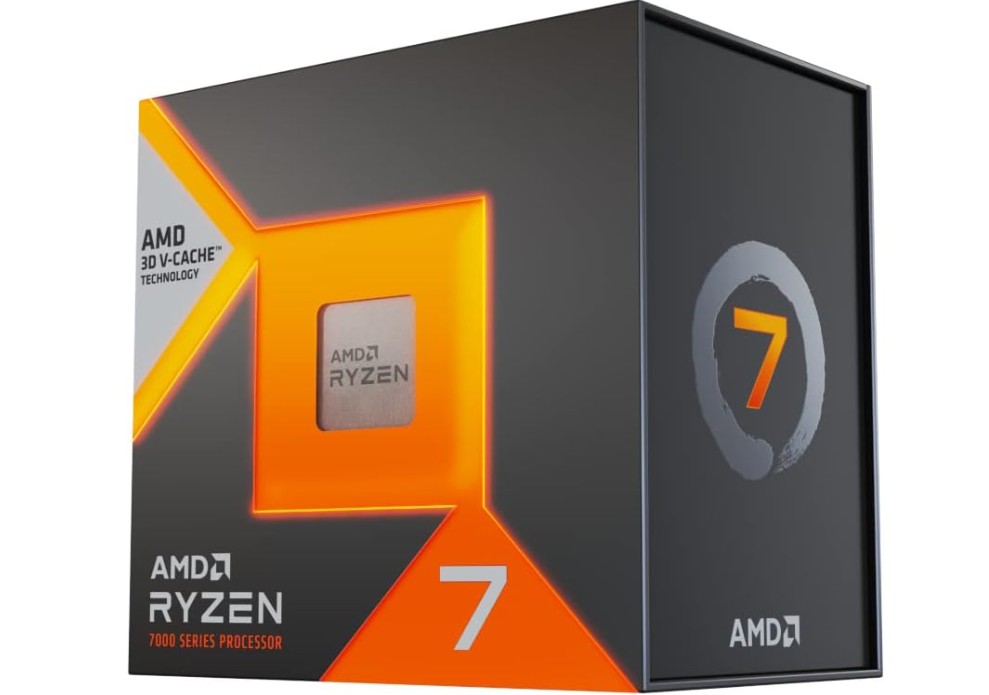
AMD Ryzen 7 7800X3D Desktop Processor
AMD Ryzen 7 7800X3D Desktop Processor
The AMD Ryzen 7 7800X3D is one of the best processors you can choose if you’re planning to pair it with the RX 7700 XT. Designed with gamers in mind, it uses AMD’s advanced 3D V-Cache technology to deliver outstanding performance in titles that are both CPU and GPU demanding. With 8 cores and 16 threads, it strikes a perfect balance between raw processing power and gaming efficiency, making it an excellent choice for 1440p setups where the RX 7700 XT really shines. In fast-paced games, the extra cache ensures smoother frame rates and more consistent performance, reducing stutters and keeping gameplay fluid even when things get intense.
One of the biggest advantages of the 7800X3D is its efficiency. Despite delivering high-end performance, it runs cooler and consumes less power compared to many competing processors. This means you don’t need overly aggressive cooling to keep it stable, and your system will likely run quieter during long gaming sessions. When combined with the RX 7700 XT, you get a build that is powerful yet efficient, capable of handling modern games and competitive esports titles with ease.
While the 7800X3D excels at gaming, it isn’t necessarily the best option for heavy productivity workloads. Tasks like video rendering or 3D modeling may benefit more from CPUs with higher clock speeds or more cores. However, for a gamer-first system centered around the RX 7700 XT, this trade-off is more than acceptable. The processor is focused on delivering the best possible gaming experience, and that’s exactly what it does.
Verdict
Overall, the Ryzen 7 7800X3D is an ideal companion for the RX 7700 XT. It ensures the GPU is never held back, providing top-tier frame rates, excellent responsiveness, and future-proof performance for years of gaming ahead.
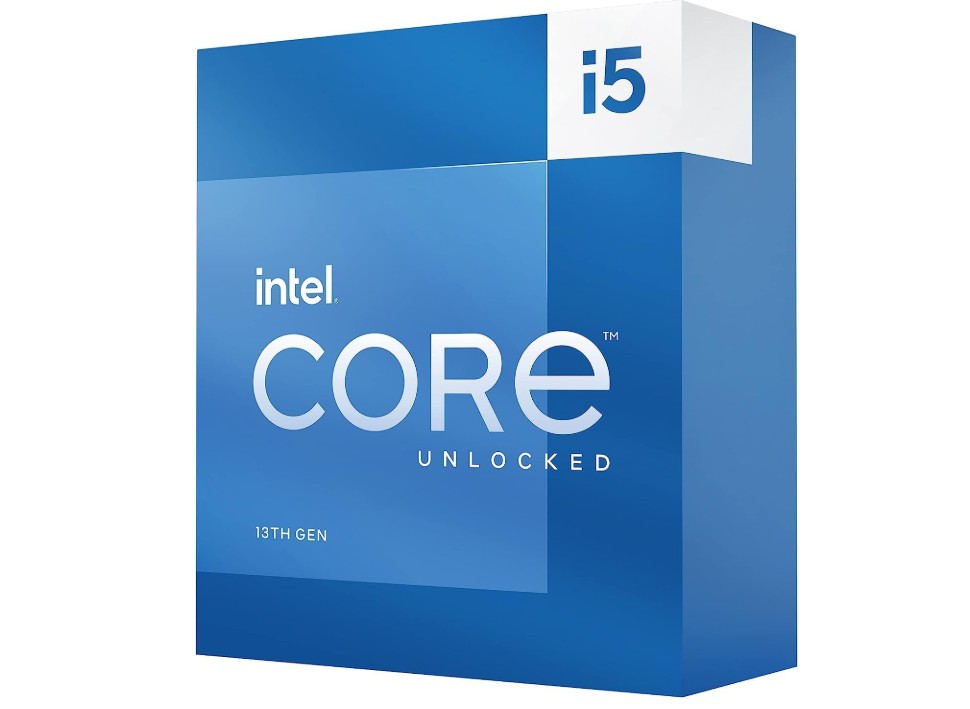
Intel Core i5-13600K Desktop Processor
Intel Core i5-13600K Desktop Processor
The Intel Core i5-13600K is a standout choice for pairing with the RX 7700 XT, offering a compelling balance between performance and value. With its 14 cores—6 performance cores and 8 efficiency cores—this processor delivers robust multi-threaded capabilities and impressive single-core speeds, making it well-suited for both gaming and productivity tasks.
In gaming scenarios, the i5-13600K ensures that the RX 7700 XT operates at its full potential. Whether you’re gaming at 1080p or 1440p, this CPU provides the necessary horsepower to prevent bottlenecks, allowing the GPU to deliver smooth and responsive gameplay. Its high boost clock speeds and efficient architecture contribute to excellent frame rates across a variety of titles.
Beyond gaming, the i5-13600K excels in multi-threaded applications, thanks to its hybrid core design. This makes it a versatile option for users who engage in content creation, streaming, or other demanding tasks, all while maintaining power efficiency.
However, it’s important to consider cooling requirements. The unlocked nature of the i5-13600K allows for overclocking, which can yield additional performance gains. To achieve stable overclocking, a high-quality cooling solution is recommended to manage the increased thermal output.
Verdict
In summary, the Intel Core i5-13600K offers exceptional performance that complements the RX 7700 XT, making it an excellent choice for gamers and content creators seeking a powerful and efficient CPU-GPU combination. Its versatility and performance make it a strong contender in the mid-range market.
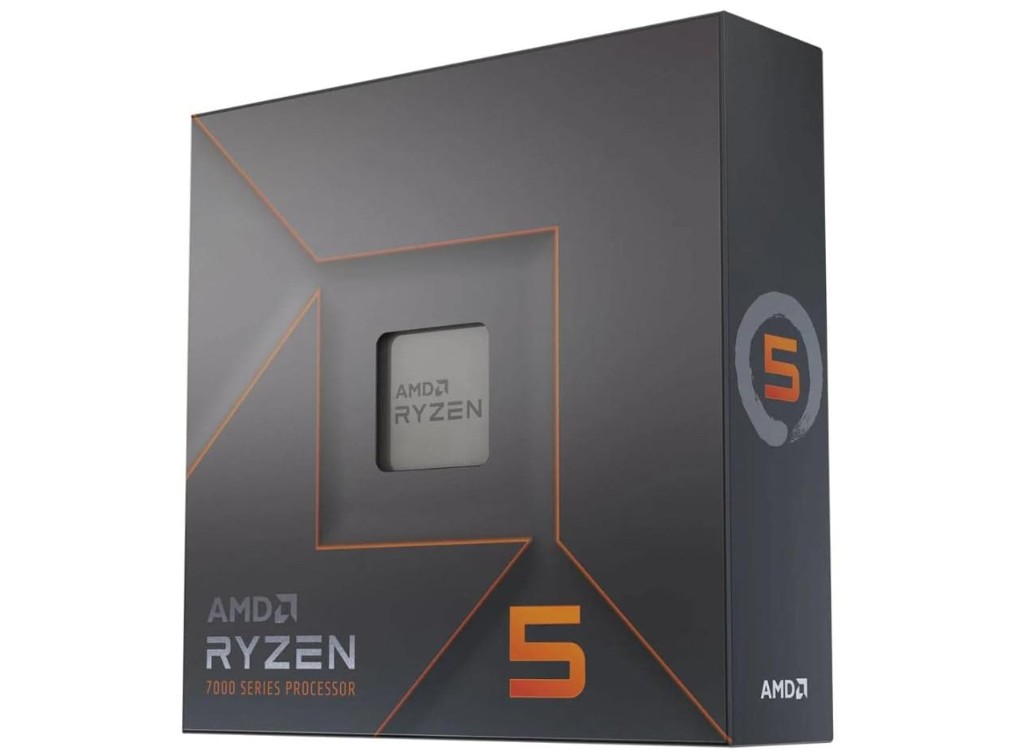
AMD Ryzen 5 7600X Desktop Processor
AMD Ryzen 5 7600X Desktop Processor
The AMD Ryzen 5 7600X is a compelling choice for pairing with the RX 7700 XT, especially for gamers targeting high-refresh 1440p or even 4K gaming experiences. With its 6 cores and 12 threads, it offers a sweet spot between performance and value, delivering impressive single-threaded performance thanks to its high boost clock speeds.
In gaming scenarios, the 7600X ensures that the RX 7700 XT operates at its full potential. Whether you’re gaming at 1440p or higher resolutions, this CPU provides the necessary horsepower to prevent bottlenecks, allowing the GPU to deliver smooth and responsive gameplay. Its high boost clock speeds and efficient architecture contribute to excellent frame rates across a variety of titles.
Beyond gaming, the 7600X excels in multi-threaded applications, thanks to its Zen 4 architecture. This makes it a versatile option for users who engage in content creation, streaming, or other demanding tasks, all while maintaining power efficiency.
However, it’s important to consider cooling requirements. The unlocked nature of the 7600X allows for overclocking, which can yield additional performance gains. To achieve stable overclocking, a high-quality cooling solution is recommended to manage the increased thermal output.
Verdict
In summary, the AMD Ryzen 5 7600X offers exceptional performance that complements the RX 7700 XT, making it an excellent choice for gamers seeking a powerful and efficient CPU-GPU combination. Its versatility and performance make it a strong contender in the mid-range market.
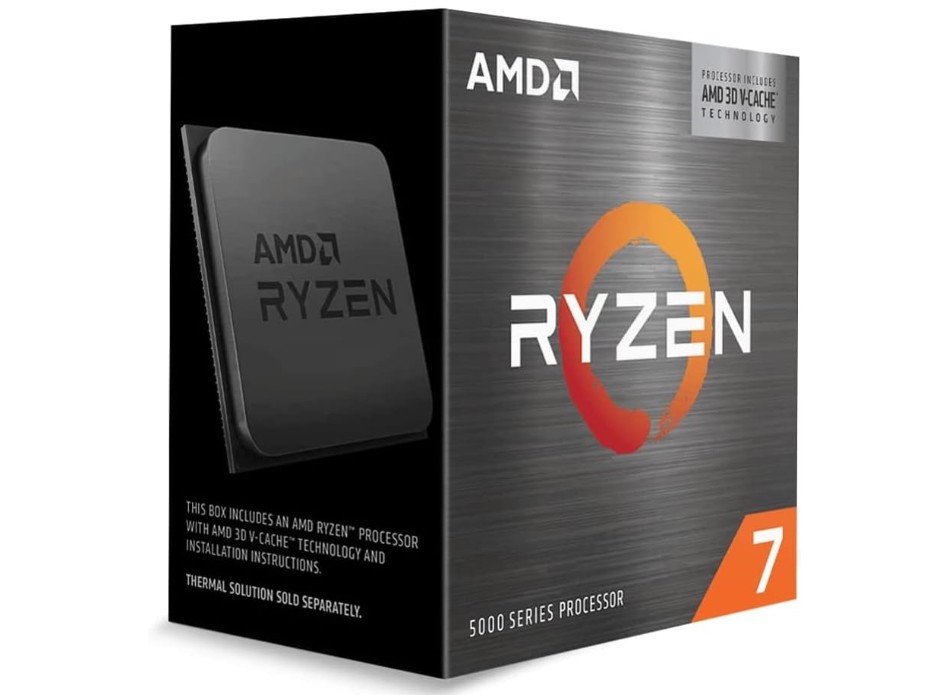
AMD Ryzen 7 5800X3D Desktop Processor
AMD Ryzen 7 5800X3D Desktop Processor
The AMD Ryzen 7 5800X3D is a standout processor for gaming enthusiasts, particularly when paired with the RX 7700 XT. Its 8 cores and 16 threads, combined with AMD’s innovative 3D V-Cache technology, deliver exceptional performance in CPU-bound games. This makes it an excellent choice for gamers seeking high frame rates and responsiveness.
In gaming benchmarks, the 5800X3D has demonstrated impressive results. For instance, in titles like Shadow of the Tomb Raider, it achieved a 19% performance increase over its predecessor, the 5800X, and outperformed Intel’s 12900K by 4% when using the same DDR4-3200 memory. This performance boost is attributed to the enhanced L3 cache provided by the 3D V-Cache.
When paired with the RX 7700 XT, the 5800X3D ensures that the GPU operates at its full potential, minimizing bottlenecks and delivering smooth gameplay. This combination is particularly effective for 1440p gaming, where both the CPU and GPU can be fully utilized.
However, it’s worth noting that the 5800X3D is optimized primarily for gaming. While it performs admirably in gaming scenarios, its performance in productivity tasks may not be as competitive compared to other processors with higher clock speeds or more cores. Additionally, the 5800X3D is not unlocked for overclocking, which may limit enthusiasts seeking to push their hardware to the limits.
Verdict
In conclusion, the AMD Ryzen 7 5800X3D is a top-tier choice for gamers looking to maximize performance when paired with the RX 7700 XT. Its gaming-centric design and enhanced cache architecture make it a compelling option for high-performance gaming builds.
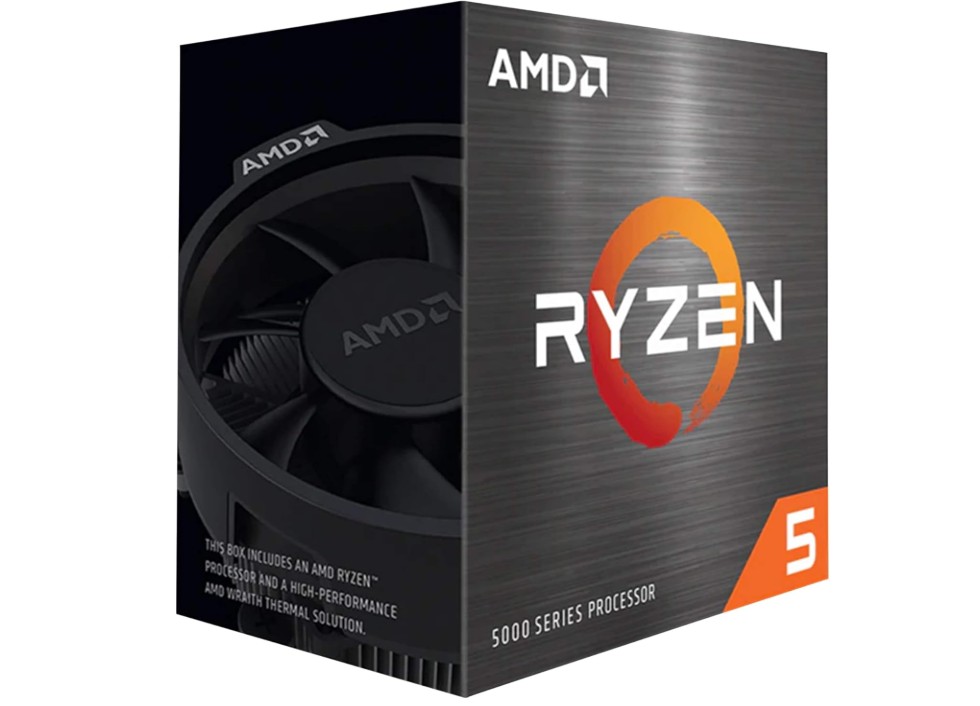
AMD Ryzen 5 5600 6-Core, Desktop Processor
AMD Ryzen 5 5600 6-Core, Desktop Processor
The AMD Ryzen 5 5600 is a compelling choice for pairing with the RX 7700 XT, offering a balanced blend of performance and value. With its 6 cores and 12 threads, it delivers robust performance for modern gaming and multitasking scenarios.
In gaming benchmarks, the combination of the Ryzen 5 5600 and RX 7700 XT has shown impressive results. For instance, in titles like Apex Legends, the system achieved 184 FPS at 1440p Ultra settings, and in Call of Duty: Modern Warfare 3, it reached 159 FPS at 1440p Ultra settings. These figures indicate that the Ryzen 5 5600 can effectively handle high-refresh-rate gaming when paired with the RX 7700 XT.
However, it’s important to consider that while the Ryzen 5 5600 offers strong performance, it may not fully unlock the potential of the RX 7700 XT in certain CPU-intensive scenarios. For example, in games like Last Epoch, some users have reported experiencing stuttering and lower frame rates in high-density areas, suggesting that the CPU may become a limiting factor in such situations.
Verdict
In conclusion, the AMD Ryzen 5 5600 is a solid choice for gamers seeking a cost-effective solution that delivers strong performance in a wide range of titles. While it may not be the absolute top performer in every scenario, it offers excellent value and is well-suited for most gaming experiences when paired with the RX 7700 XT.
Buying Guide for CPUs For AMD RX 7700 XT
The AMD Radeon RX 7700 XT is a mid-to-high-end graphics card designed for 1440p gaming. It boasts the RDNA 3 architecture, offering improved performance and efficiency over its predecessors. To fully harness its capabilities, pairing it with a compatible CPU is crucial to avoid bottlenecks and ensure smooth gameplay.
Key Factors to Consider
When building a gaming PC around the AMD RX 7700 XT, selecting the right CPU is just as crucial as choosing the graphics card itself. The RX 7700 XT is a mid-to-high-end GPU designed to deliver excellent 1440p gaming performance and strong results at 1080p and even entry-level 4K gaming. However, pairing it with a weak or incompatible CPU can create a bottleneck, preventing the GPU from reaching its full potential. Understanding the key factors that influence CPU performance and compatibility is essential for ensuring smooth gameplay, high frame rates, and a future-proof system. Below, we break down the most important considerations to guide your decision.
1. CPU and GPU Balance
One of the first factors to consider is ensuring a proper balance between your CPU and the RX 7700 XT. A CPU that is too weak can limit your graphics card’s performance, a phenomenon known as bottlenecking. This is especially noticeable in CPU-intensive games, where a slow processor can cause frame rate drops and stuttering, regardless of how powerful the GPU is. On the other hand, a CPU that is overly powerful for the RX 7700 XT can lead to unnecessary overspending without meaningful performance gains. Generally, CPUs with 6–8 cores and 12–16 threads are ideal for most gamers pairing with this GPU. These configurations provide enough multi-threaded power for modern games while leaving headroom for background tasks such as streaming or running system utilities.
2. Gaming Resolution and Refresh Rate
The resolution at which you plan to game significantly affects which CPU you should choose. At 1080p, the CPU has a larger impact on performance because the GPU isn’t fully stressed. A CPU with high clock speeds and strong single-core performance is essential to achieve high frame rates, particularly for competitive titles like Valorant, CS:GO, or Fortnite. At 1440p, which is the sweet spot for the RX 7700 XT, both the CPU and GPU matter. Here, the RX 7700 XT is capable of pushing high frame rates, but a capable CPU ensures consistent performance and prevents dips in demanding scenes. For 4K gaming, the GPU typically becomes the limiting factor, meaning even mid-tier CPUs can keep pace, but high-end CPUs still provide benefits in CPU-heavy titles or games with complex AI and physics calculations.
3. Core Count and Threads
Modern games are increasingly optimized to take advantage of multiple CPU cores and threads. While older titles might only rely on two or four cores, today’s games often leverage six or more. For the RX 7700 XT, a CPU with 6–8 cores and 12–16 threads strikes an optimal balance between performance and cost. Multi-core CPUs are especially important if you plan on streaming, recording gameplay, or running other applications in the background. For example, a 6-core, 12-thread CPU is sufficient for most gaming needs, while an 8-core, 16-thread CPU provides more headroom for future titles and multitasking workloads.
4. Clock Speeds and Single-Core Performance
In gaming, single-core performance and clock speeds often matter more than total core count. Many games, particularly competitive or fast-paced titles, rely on individual cores to process game logic efficiently. A higher base and boost clock allows the CPU to handle complex calculations quickly, resulting in smoother gameplay and reduced stutter. CPUs like the AMD Ryzen 7 7800X3D or Intel Core i5-13600K combine strong single-core performance with multiple threads, making them excellent choices for gaming with the RX 7700 XT.
5. Platform Compatibility
Another crucial factor is ensuring that your CPU is compatible with your motherboard and the RX 7700 XT. This involves checking the CPU socket type, chipset, and memory support. For example, newer AMD CPUs like the Ryzen 7000 series require an AM5 socket, while Intel’s 13th Gen Core series uses LGA 1700. The motherboard should also support PCIe 4.0 or 5.0 to allow the RX 7700 XT to operate at full bandwidth. Ensuring compatibility prevents future headaches and makes upgrading your system easier.
6. Future-Proofing
Investing in a CPU that is future-proof can save you money in the long term. CPUs that support DDR5 memory and PCIe 5.0 allow for easier upgrades in the future and better overall system longevity. Even if your current GPU is mid-range, a future-proof CPU ensures that when you eventually upgrade your graphics card, the CPU will not become a bottleneck. Future-proofing also means choosing a processor with more cores and threads than you currently need, as upcoming games and applications continue to demand more CPU resources.
7. Thermal Management and Cooling
The thermal characteristics of a CPU are often overlooked but are vital for maintaining performance and longevity. High-performance CPUs generate more heat, especially under heavy loads or during overclocking. Ensuring that your CPU has an adequate cooling solution, whether it’s a quality air cooler or an all-in-one liquid cooler, can prevent thermal throttling and keep frame rates consistent. Additionally, efficient cooling contributes to a quieter system and reduces wear on components over time.
8. Power Consumption and Efficiency
Power consumption, measured in TDP (Thermal Design Power), is another key factor. CPUs with higher TDPs can consume more power and produce more heat, which may require stronger cooling and a higher-wattage PSU. Efficiency matters if you want a cooler, quieter, and more energy-efficient system. For the RX 7700 XT, mid-range CPUs with moderate TDPs often provide the best balance of performance and efficiency.
9. Overclocking Potential
Some gamers like to overclock their CPUs to squeeze out extra performance. Unlocked CPUs like AMD’s Ryzen “X” series or Intel’s “K” series allow for manual overclocking. If you plan to overclock, consider the cooling requirements and motherboard support for stable operation. Overclocking can offer noticeable gains in CPU-heavy games, ensuring the RX 7700 XT isn’t bottlenecked in demanding scenes.
10. Budget Considerations
Finally, budget plays a major role in CPU selection. Overspending on a high-end CPU while pairing it with a mid-range GPU like the RX 7700 XT may not be cost-effective. Conversely, choosing a very low-end CPU can significantly bottleneck the GPU. A balanced approach is recommended, allocating around 30–40% of your total budget to the CPU when paired with the RX 7700 XT. Mid-range CPUs often provide the best value, offering excellent gaming performance without unnecessary costs.
11. Integrated Graphics vs. Discrete GPU Pairing
Since the RX 7700 XT is a dedicated graphics card, the CPU does not need to have integrated graphics. However, some CPUs include integrated graphics as a backup, which can be useful for troubleshooting or temporary setups. While this is not critical, it is a factor to consider if you want flexibility in case the GPU fails or needs servicing.
12. Workload Considerations Beyond Gaming
While the focus is on gaming, consider whether you will use your system for productivity tasks such as video editing, 3D rendering, or streaming. Multi-threaded CPUs with higher core counts handle these workloads more efficiently. Even for gaming-focused builds, having extra cores can improve background task performance and reduce performance drops while streaming or multitasking.
Conclusion
Choosing the right CPU for the AMD RX 7700 XT requires careful consideration of multiple factors: CPU-GPU balance, gaming resolution, core count, clock speeds, platform compatibility, future-proofing, cooling, power consumption, overclocking potential, budget, and additional workloads. For most gamers, CPUs with 6–8 cores and 12–16 threads, strong single-core performance, and efficient thermal and power management will provide excellent results. Balancing performance and cost ensures that the RX 7700 XT operates at full potential, delivering smooth gameplay, high frame rates, and an enjoyable gaming experience for years to come. By taking these key factors into account, you can build a system that maximizes both performance and value.
A passionate tech enthusiast with a deep interest in the latest innovations, gadgets, and emerging technologies. Always eager to explore cutting-edge hardware and software, I enjoy sharing insights, reviews, and recommendations to help others make informed decisions in the ever-evolving tech world. With a curious mindset and hands-on approach, I stay up-to-date with industry trends, from PCs and gaming to mobile devices and AI-driven tools.






